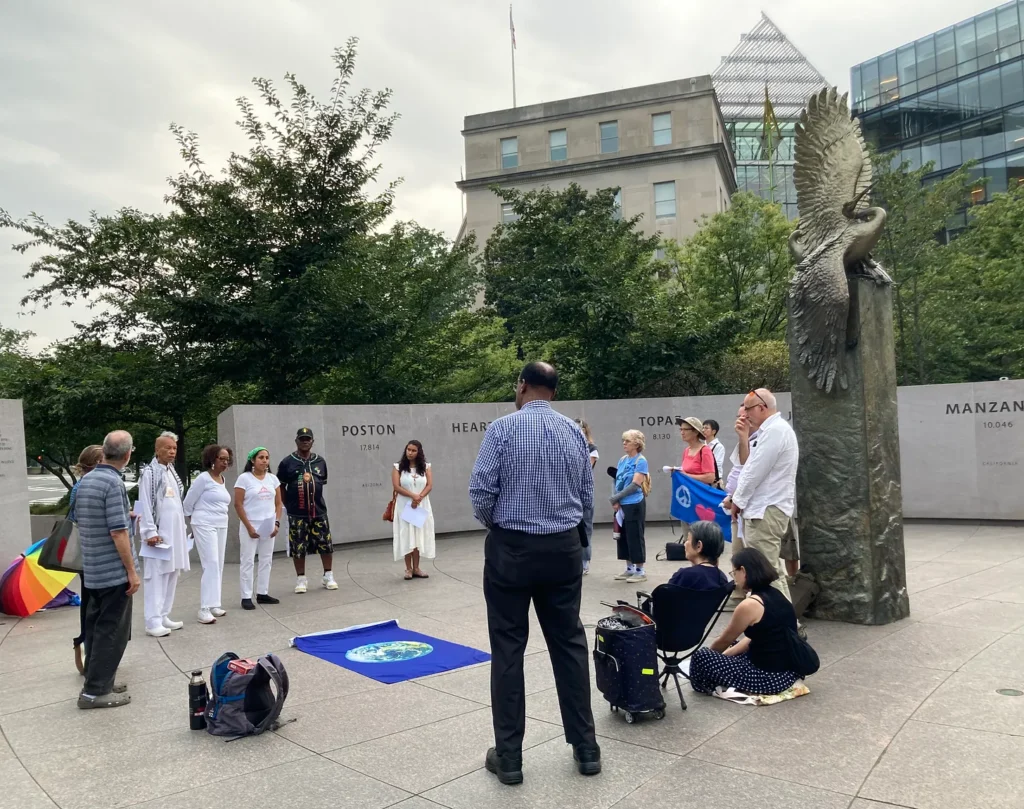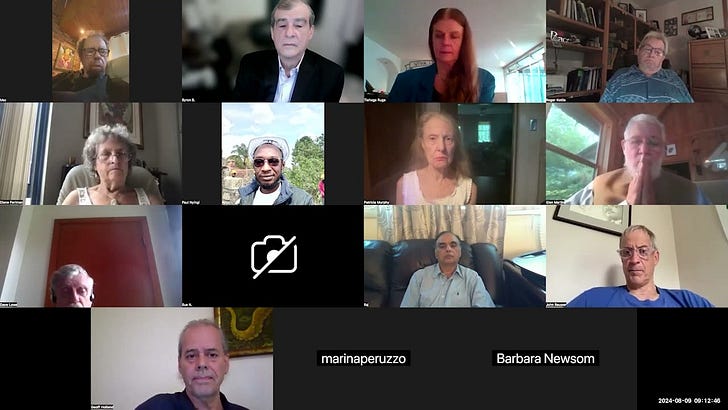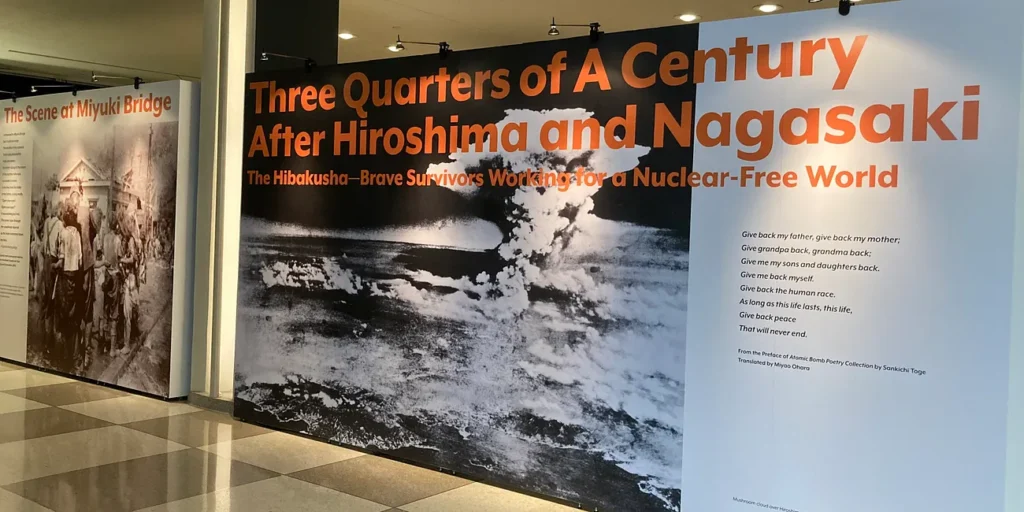80 Years Ago, today…
TRANSCEND MEMBERS, 18 Aug 2025
Diane Perlman, Ph.D. | Political Therapy - TRANSCEND Media Service
… and a Sample of My Work on Psychology of Nuclear Dynamics
10 Aug 2025 – Twenty years ago today, August 9, I was in Nagasaki, having come from Hiroshima, for the 60th anniversary of the unnecessary, diabolical US atomic bombing of civilians in two cities, and the annual World Conference Against the A & H Bombs.
Every year on August 6, the city of Hiroshima holds a Peace Memorial Ceremony. Here is MATSUI Kazumi, the Mayor of the City of Hiroshima, delivering the annual Peace Declaration, marking the 80th year of the atomic bombing.
August 6 and 9 are solemn days for me. I often fast.
UN Nuclear Conferences
Since 2000, I have attended almost every nuclear conference at the UN as an observer representing civil society, including:
- the Nuclear Nonproliferation Treaty Conferences (5 year Review Conferences and Preparatory Committee meetings)
- the Treaty on the Prohibition of of Nuclear Weapons (the Ban Treaty) and
- the Conference on a WMD Free Zone in the Middle East. My primary interests have been psychology and conflict dynamics.
I wish to shed light on what goes on during these international fora and specifically the dynamics between civil society and many countries in the world and those who possess nuclear weapons and their allies under their “nuclear umbrella.”
One Year Ago Today
On Nagasaki Day, 2024, I did this presentation for the Earth Constitution Institute.
My Nagasaki Day Panel Presentation
Below is a sampling of my work on nukes including:
NIE: PIE in Our Face about National Intelligence Estimate and exaggerated threats August, 2007
Pressuring Iran: Self Fulfilling Paranoia and the Law of Opposites, October 2008
The NPT and the Nuclear Power TRAP, May,2010
Transcending Nukes, October, 2017
Quantum Politics, the TRANSCEND Method and Second Order Change, October, 2017
The Nuclear Nonproliferation Treaty: Primary Conflicts and Second Order Change, May 2019
A Guided Tour of the Nuclear Nonproliferation Treaty Review Conference: Failures, Flaws, and Promises: PHOTO ESSAY – The Next Best Thing to Being There, October 2022
Outside the Deterrence Box, September, 2023 (original May, 2010)
NUCLEAR NOBELS, December 2024
But first …..
Here is a short, clear, compelling piece on Preventing Armageddon that I love by Mort Deutsch, PhD. He first gave me the 1984 version of this document for the 2005 Nuclear Nonproliferation Treaty Review Conference for Psychologists for Social Responsibility, which I represented. He made this revision for the 2010 NPT Review Conference.
Mort was a founding member of the World Dignity University initiative and Global Advisory Board Member of the Human Dignity and Humiliation Studies organization, President of the Society for the Psychological Study of Social Issues, the International Society of Political Psychology. In 1986 Deutsch founded the International Center for Cooperation and Conflict Resolution (ICCCR) at Columbia.
He died in March, 2017 at the age of 97, and was active until the end and was a supportive colleague and mentor to many.
PSYCHOLOGISTS FOR SOCIAL RESPONSIBILITY
Preventing Armageddon in the 21st Century by Morton Deutsch, Ph.D.
Some conflicts – whether between spouses, labor and management, or nations – seem to escalate out of control. They follow a malignant course toward outcomes that nobody wants. People who are caught up in such conflict usually find ample justification for blaming the other party. It seldom occurs to the opponents to look hard at the conflict itself, including the conditions that intensify it or might de-escalate it.
Psychologists and other social scientists are well acquainted with such conflicts. Conflict research yields knowledge that has been successfully applied and can be productively applied to the conflicts between Palestinians and Israelis, India and Pakistan, the volatile situation with Iran, and other conflicts that seem to be stuck in the kind of escalating sequence that could lead to continued mutual harm. The findings of research on conflict do not replace the need for expert understanding of our antagonists or of the technical side of arms negotiation. But focusing on the typical characteristics of the conflict process itself, rather than exclusively on the characteristics and motives of our antagonists, may suggest a different approach for dealing with an adversary. How we define the problem determines where we look for solutions.
What do we know about malignant conflicts – ones that lead to bad results from everybody’s standpoint?
A win-or-lose orientation tend to escalate conflicts. Under controlled laboratory conditions research has shown that when the participants define a conflict as a win or lose situation, several consequences are predictable: a) communication is impaired, reinforcing existing stereotypes and encouraging misinformation and error; b) the opponents become more suspicious of each other, more sensitive to difference and threats, and c) each party becomes convinced that a solution to the conflict can only be found through superior force or by outwitting the antagonist. Thus, disputes over specific issues that might be resolved to the satisfaction of both parties become struggles solely for superior power.
Malignant conflicts encourage misperception and misjudgments that yield unwanted results. Research shows that during such conflicts, each party tends to perceive its own behavior more favorably than the other’s, and to look at the conflict from a “blaming” rather than “problem-solving” point of view. As the conflict escalates, the actions taken by each party commit each more deeply to policies that perpetuate the conflict; the opponents thus become locked into their positions of self-interest rather than open to exploring mutually desirable policies and programs. Information communications and contact, which might mitigate the conflict, are reduced. All parties become so focused on winning that they readily lose sight of their basic interests – which is the case of many intractable conflicts whether at the interpersonal or international levels.
Psychological experiments suggest that when one party in a conflict attempts to increase its security without regard for the security of the other party, the attempt readily becomes self-defeating. Such a situation is potentially catastrophic when the stakes involve nuclear war. If military inferiority is dangerous, so is superiority. It is dangerous for either side in a conflict to feel tempted or frightened into action, or to have grounds to believe that its antagonist might be so tempted or frightened. According to this analysis, our security and that of an adversary can only be obtained through our mutual security.
Conflict research provides no easy answers to our difficult conflicts. However, by focusing on factors involved in the dynamics of the conflict itself, rather than simply on the blameworthiness of our opponent, conflict research has highlighted the need for different strategies from those that follow from our own blind involvement in the conflict process. Such strategies ought to include initiatives aimed at opening communication and finding common objectives. Neither party in a conflict has a complete monopoly on good or evil. Neither is insane. It is the conflict process that is crazy. With imagination, patience, and commitment, we can do something about that.
References
Deutsch, M. (1973). The resolution of conflict: Constructive and destructive processes. New Haven: Yale University Press.
Deutsch, M., Coleman, P. T., & Marcus, E. (Eds.). (2006). The handbook of conflict resolution: Theory and practice (2nd ed.). San Francisco: Jossey-Bass.
Frank, J. D. Sanity and survival in the nuclear age. (1962). New York: Random House. Jervis, R. (1976). Perception and misperception in international politics. Princeton: Princeton University Press.
Psychologists for Social Responsibility seeks to bring greater psychological knowledge and public awareness to the many issues highlighted in this brief overview. For more information, please contact us at info@psysr.org. We encourage new PsySR members to join in these efforts. Media inquiries are also welcome.
PsySR Advisory Board member Morton Deutsch is the E.L. Thorndike Professor Emeritus of Psychology and Director Emeritus of the International Center for Cooperation and Conflict Resolution (ICCCR) at Columbia University. He can be reached directly at deutsch@exchange.tc.columbia.edu. This perspective is adapted from an earlier publication, “Preventing Armageddon,” by Morton Deutsch and Brewster Smith, published by the American Psychological Association.
For anyone interested here is a sample of my work on Huffington Post, Transcend Media Service and Substack. Pardon my difficulties with irregularities in formatting.
NIE: PIE in Our Face about National Intelligence Estimate and exaggerated threats. 08/01/2007
Pressuring Iran: Self Fulfilling Paranoia and the Law of Opposites, October 2008https://www.huffingtonpost.com/entry/pressuring-iran-self-fulf_b_128907
The NPT and the Nuclear Power TRAP. 05/31/2010 https://www.transcend.org/tms/2010/05/the-npt-and-the-nuclear-power-trap/
Transcending Nukes about the TPNW Ban Treaty, October, 2017 https://www.transcend.org/tms/2017/10/transcending-nukes/
Quantum Politics, the TRANSCEND Method and Second Order Change, October, 2017
The Nuclear Nonproliferation Treaty: Primary Conflicts and Second Order Change, May 2019
A Guided Tour of the Nuclear Nonproliferation Treaty Review Conference: Failures, Flaws, and Promises: Photo Essay
A Guided Tour of the Nuclear Nonproliferation Treaty Review Conference: Failures, Flaws, and Promises
OUTSIDE THE DETERRENCE BOX, September, 2023
NUCLEAR NOBELS, December, 2024
_____________________________________________
 Diane Perlman, PhD is a clinical and political psychologist, devoted to applying knowledge from psychology, conflict studies and social sciences to designing strategies and policies to reverse nuclear proliferation, to drastically reduce terrorism, reduce enmity, and to raise consciousness about nonviolent strategies for tension reduction and conflict transformation. She is a visiting scholar at the School for Conflict Analysis and Resolution at George Mason University, is active in Psychologists for Social Responsibility, the TRANSCEND Network for Peace Development Environment, and on the Global Council of Abolition 2000. Some of her writings can be found on www.consciouspolitics.org and www.SanityandSurvival.com. Email: dianeperlman@gmail.com
Diane Perlman, PhD is a clinical and political psychologist, devoted to applying knowledge from psychology, conflict studies and social sciences to designing strategies and policies to reverse nuclear proliferation, to drastically reduce terrorism, reduce enmity, and to raise consciousness about nonviolent strategies for tension reduction and conflict transformation. She is a visiting scholar at the School for Conflict Analysis and Resolution at George Mason University, is active in Psychologists for Social Responsibility, the TRANSCEND Network for Peace Development Environment, and on the Global Council of Abolition 2000. Some of her writings can be found on www.consciouspolitics.org and www.SanityandSurvival.com. Email: dianeperlman@gmail.com
Go to Original – coronawise.substack.com
Tags: ICAN-International Campaign to Abolish Nuclear Weapons, Nuclear Abolition, Nuclear Ban Treaty
DISCLAIMER: The statements, views and opinions expressed in pieces republished here are solely those of the authors and do not necessarily represent those of TMS. In accordance with title 17 U.S.C. section 107, this material is distributed without profit to those who have expressed a prior interest in receiving the included information for research and educational purposes. TMS has no affiliation whatsoever with the originator of this article nor is TMS endorsed or sponsored by the originator. “GO TO ORIGINAL” links are provided as a convenience to our readers and allow for verification of authenticity. However, as originating pages are often updated by their originating host sites, the versions posted may not match the versions our readers view when clicking the “GO TO ORIGINAL” links. This site contains copyrighted material the use of which has not always been specifically authorized by the copyright owner. We are making such material available in our efforts to advance understanding of environmental, political, human rights, economic, democracy, scientific, and social justice issues, etc. We believe this constitutes a ‘fair use’ of any such copyrighted material as provided for in section 107 of the US Copyright Law. In accordance with Title 17 U.S.C. Section 107, the material on this site is distributed without profit to those who have expressed a prior interest in receiving the included information for research and educational purposes. For more information go to: http://www.law.cornell.edu/uscode/17/107.shtml. If you wish to use copyrighted material from this site for purposes of your own that go beyond ‘fair use’, you must obtain permission from the copyright owner.
Join the discussion!
We welcome debate and dissent, but personal — ad hominem — attacks (on authors, other users or any individual), abuse and defamatory language will not be tolerated. Nor will we tolerate attempts to deliberately disrupt discussions. We aim to maintain an inviting space to focus on intelligent interactions and debates.


